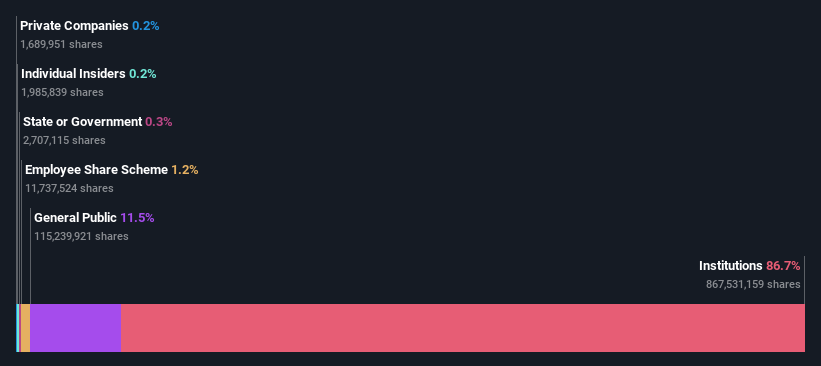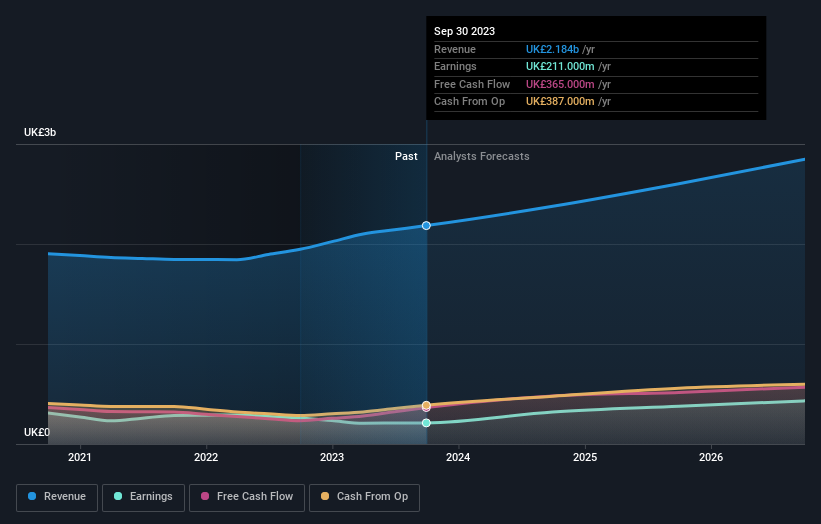Stock Analysis
- United Kingdom
- /
- Software
- /
- LSE:SGE
Institutional investors may overlook The Sage Group plc's (LON:SGE) recent UK£418m market cap drop as long-term gains remain positive

Key Insights
- Given the large stake in the stock by institutions, Sage Group's stock price might be vulnerable to their trading decisions
- The top 14 shareholders own 50% of the company
- Using data from analyst forecasts alongside ownership research, one can better assess the future performance of a company
If you want to know who really controls The Sage Group plc (LON:SGE), then you'll have to look at the makeup of its share registry. With 87% stake, institutions possess the maximum shares in the company. In other words, the group stands to gain the most (or lose the most) from their investment into the company.
Institutional investors was the group most impacted after the company's market cap fell to UK£12b last week. However, the 57% one-year return to shareholders might have softened the blow. But they would probably be wary of future losses.
In the chart below, we zoom in on the different ownership groups of Sage Group.
View our latest analysis for Sage Group

What Does The Institutional Ownership Tell Us About Sage Group?
Institutions typically measure themselves against a benchmark when reporting to their own investors, so they often become more enthusiastic about a stock once it's included in a major index. We would expect most companies to have some institutions on the register, especially if they are growing.
Sage Group already has institutions on the share registry. Indeed, they own a respectable stake in the company. This can indicate that the company has a certain degree of credibility in the investment community. However, it is best to be wary of relying on the supposed validation that comes with institutional investors. They too, get it wrong sometimes. If multiple institutions change their view on a stock at the same time, you could see the share price drop fast. It's therefore worth looking at Sage Group's earnings history below. Of course, the future is what really matters.

Investors should note that institutions actually own more than half the company, so they can collectively wield significant power. We note that hedge funds don't have a meaningful investment in Sage Group. BlackRock, Inc. is currently the company's largest shareholder with 9.4% of shares outstanding. Meanwhile, the second and third largest shareholders, hold 6.6% and 5.0%, of the shares outstanding, respectively.
After doing some more digging, we found that the top 14 have the combined ownership of 50% in the company, suggesting that no single shareholder has significant control over the company.
Researching institutional ownership is a good way to gauge and filter a stock's expected performance. The same can be achieved by studying analyst sentiments. Quite a few analysts cover the stock, so you could look into forecast growth quite easily.
Insider Ownership Of Sage Group
The definition of company insiders can be subjective and does vary between jurisdictions. Our data reflects individual insiders, capturing board members at the very least. Company management run the business, but the CEO will answer to the board, even if he or she is a member of it.
Insider ownership is positive when it signals leadership are thinking like the true owners of the company. However, high insider ownership can also give immense power to a small group within the company. This can be negative in some circumstances.
Our information suggests that The Sage Group plc insiders own under 1% of the company. It is a very large company, so it would be surprising to see insiders own a large proportion of the company. Though their holding amounts to less than 1%, we can see that board members collectively own UK£24m worth of shares (at current prices). Arguably recent buying and selling is just as important to consider. You can click here to see if insiders have been buying or selling.
General Public Ownership
With a 12% ownership, the general public, mostly comprising of individual investors, have some degree of sway over Sage Group. This size of ownership, while considerable, may not be enough to change company policy if the decision is not in sync with other large shareholders.
Next Steps:
It's always worth thinking about the different groups who own shares in a company. But to understand Sage Group better, we need to consider many other factors. For example, we've discovered 1 warning sign for Sage Group that you should be aware of before investing here.
But ultimately it is the future, not the past, that will determine how well the owners of this business will do. Therefore we think it advisable to take a look at this free report showing whether analysts are predicting a brighter future.
NB: Figures in this article are calculated using data from the last twelve months, which refer to the 12-month period ending on the last date of the month the financial statement is dated. This may not be consistent with full year annual report figures.
Valuation is complex, but we're helping make it simple.
Find out whether Sage Group is potentially over or undervalued by checking out our comprehensive analysis, which includes fair value estimates, risks and warnings, dividends, insider transactions and financial health.
View the Free AnalysisHave feedback on this article? Concerned about the content? Get in touch with us directly. Alternatively, email editorial-team (at) simplywallst.com.
This article by Simply Wall St is general in nature. We provide commentary based on historical data and analyst forecasts only using an unbiased methodology and our articles are not intended to be financial advice. It does not constitute a recommendation to buy or sell any stock, and does not take account of your objectives, or your financial situation. We aim to bring you long-term focused analysis driven by fundamental data. Note that our analysis may not factor in the latest price-sensitive company announcements or qualitative material. Simply Wall St has no position in any stocks mentioned.
About LSE:SGE
Sage Group
Provides technology solutions and services for small and medium businesses in the United States, the United Kingdom, France, and internationally.
Reasonable growth potential with proven track record and pays a dividend.

